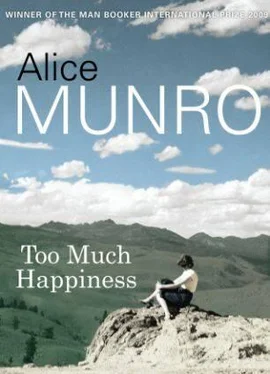Nancy’s mother wrapped a towel around her and somehow got her to the hospital. There was no ambulance at that time. She probably flagged a car on the Square. Why did she not phone my father? No matter-she didn’t. The cuts were not deep and the blood loss was not so great in spite of the splatters-there was no cut to any major blood vessel. Nancy’s mother kept berating the child that whole time and asking was she right in the head.
“You’re just my luck,” she kept saying. “A kid like you.”
“If there had been social workers around at that time,” said my mother, “no doubt that poor little thing would have been made a ward of the Children’s Aid.
“It was the same cheek,” she said. “Like yours.”
I tried to keep silent, pretending not to know what she was talking about. But I had to speak.
“The paint was over her whole face,” I said.
“Yes. But she was doing it more carefully this time, she cut open just that one cheek, trying the best she could to make herself look like you.”
This time I did manage to keep quiet.
“If she had been a boy it would have been different. But what an awful thing for a girl.”
“Plastic surgeons can do remarkable things nowadays.”
“Oh, maybe they can.”
After a moment she said, “Such deep feelings. Children have.”
“They get over that.”
She said she did not know what had become of them, the child or her mother. She said she was glad I had never asked, because she would have hated to tell me anything so distressing, when I was still young.
I don’t know what bearing it has on anything, but I have to say that my mother changed completely in extreme old age, becoming ribald and fanciful. She claimed that my father had been a magnificent lover and that she herself had been “a pretty bad girl.” She announced that I should have married “that girl who sliced up her face” because neither one of us would be able to crow over the other about doing a good deed. One of us, she cackled, would be just as much a mess as the other.
I agreed. I liked her then quite a bit.
· · ·
A few days ago I was stung by a wasp while clearing out some rotten apples under one of the old trees. The sting was on my eyelid, which rapidly closed. I drove myself to the hospital, using the other eye (the swollen one was on the “good” side of my face), and was surprised to be told I must stay overnight. The reason was that once I was given an injection, both eyes had to be bandaged, thus avoiding strain on the one that could see. I had what they call a restless night, waking often. Of course it is never really quiet in a hospital, and just in that short time without my sight it seemed that my hearing grew more acute. When certain footsteps came into my room I knew that they were those of a woman, and I had the feeling that she was not a nurse.
But when she said, “Good. You’re awake. I’m your reader,” I thought that I must have been mistaken, she was a nurse after all. I stretched out an arm, believing she had come to read what are known as the vital signs.
“No, no,” she said, in her small persistent voice. “I’ve come to read to you, if that’s what you would like. Sometimes people like it; they get bored lying there with their eyes closed.”
“Do they choose, or do you?”
“They do, but sometimes I sort of remind them. Sometimes I try and remind them of some Bible story, some part of the Bible they remember. Or a story from when they were children. I carry a whole batch of things around with me.”
“I like poetry,” I said.
“You don’t sound very enthusiastic.”
I realized that this was true, and I knew why. I have some experience of reading poetry aloud, over the radio, and of listening to other trained voices read, and there are some styles of reading I find comfortable, and some I abhor.
“Then we could have a game,” she said, just as if I had explained this, when I hadn’t. “I could read you a line or two, then I stop and see if you can do the next line. Okay?”
It struck me that she might be quite a young person, anxious to get some takers, to be a success on this job.
I said okay. But nothing in Old English, I told her.
“‘The king sat in Dunfermline town-’” she began in a questioning voice.
“‘Drinking the blood-red wine-’” I chimed in, and we proceeded in good humor. She read well enough, though at a rather childlike, show-off speed. I began to like the sound of my own voice, now and then falling into a bit of an actorly flourish.
“That’s nice,” she said.
“‘And show you where the lilies grow, / On the banks of Italie-’”
“Is it ‘grow’ or ‘blow’?” she said. “I don’t actually have a book with that in it. I should remember, though. Never mind, it’s lovely. I always liked your voice on the radio.”
“Really? Did you listen?”
“Of course. Lots of people did.”
She stopped feeding me lines and just let me go ahead. You can imagine. “Dover Beach” and “Kubla Khan” and “West Wind” and “Wild Swans” and “Doomed Youth.” Well, maybe not all of them, and maybe not right through to the end.
“You’re getting short of breath,” she said. Her little quick hand was laid on my mouth. And then her face or the side of her face, laid on mine. “I have to go. Here’s another just before I go. I’ll make it harder because I won’t start at the beginning.
“‘None will long mourn for you, / Pray for you, miss you / Your place left vacant-’”
“I’ve never heard that,” I said.
“Sure?”
“Sure. You win.”
By now I suspected something. She seemed distracted, slightly cross. I heard the geese calling as they flew over the hospital. They take practice runs at this time of year, and then the runs get longer and one day they’re gone. I was waking up, in that state of surprise, indignation, that follows a convincing dream. I wanted to go back and have her lay her face on mine. Her cheek, on mine. But dreams are not so obliging.
When I got my eyesight back, and was at home, I looked for those lines she had left me with in my dream. I went through a couple of anthologies and did not find them there. I began to suspect that the lines did not belong to a real poem at all, but had just been devised in the dream, to confound me.
Devised by whom?
But later in the fall, when I was getting some old books ready to donate to a charity bazaar, a piece of brownish paper fell out, with lines on it written in pencil. It was not my mother’s writing, and I can hardly think it would be my father’s. Whose, then? Whoever it was had written the author’s name at the end. Walter de la Mare. No title. Not a writer whose works I have any particular knowledge of. But I must have seen the poem at some time, maybe not in this copy, maybe in a textbook. I must have buried the words in a deep cubbyhole of my mind. And why? Just so that I could be teased by them, or teased by a determined girl-child phantom, in a dream?
There is no sorrow
Time heals never;
No loss, betrayal ,
Beyond repair .
Balm for the soul, then ,
Though grave shall sever
Lover from loved
And all they share .
See the sweet sun shines
The shower is over;
Flowers preen their beauty ,
The day how fair!
Brood not too closely
On love, on duty;
Friends long forgotten
May wait you where
Life with death
Brings all to an issue;
None will long mourn for you ,
Pray for you, miss you ,
Your place left vacant ,
Читать дальше












